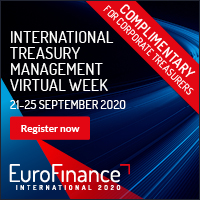EuroFinance International Treasury Management Virtual Week 21-25 September 2020
| 25-08-2020 | Eurofinance | treasuryXL |
The pandemic sent shockwaves through global financial markets and confronted businesses with extreme scenarios.
Virtual Event
Now more than ever, we need to learn and engage with other treasury professionals around the world, so that we can navigate and overcome the unprecedented challenges we are facing.
As the current situation unfolds, the role of the corporate treasurer is evolving and becoming more strategic than ever before. The complexities and function of treasury within the business is changing even more rapidly. The question is: What does the future of treasury look like and how will this affect my team? And where can I turn for world-class advice on building resiliency, supporting the business and addressing future challenges?
Look no further than EuroFinance’s International Treasury Management Virtual Week taking place 21-25 September. It will see world-leading treasurers and economists come together to address these issues, deliver big picture global insights and share the essential granular knowledge you and your team need for the path ahead. In the spotlight will be the latest on cash flow forecasting, supply chain finance, tech, liquidity and FX and payments plus much more.
Speakers and Live Sessions
The line-up of speakers is impressive with the likes of Shell, Alibaba Group, HP Inc., eBay, Finnair, Microsoft, Intel Corporation, Schlumberger, Booking Holdings Inc. and Rio Tinto holding centre stage in one of the 75+ live sessions. But don’t worry if you miss a session, they will be available on-demand for you to watch at a time that suits you.
The custom-built virtual conference platform will bring the experience of a live event to life in a virtual world. It offers plenty of opportunities to network and learn from your global peers, plus a smart calendar to build your schedule.
Free Registration
The great news is, the 2020 event comes without a price tag! It is free for corporate treasurers. So, you can get all the world-class expert knowledge and insights you expect from the leading treasury event without the costs of registration, flights, accommodation or even expenses.
What are you waiting for? Set your treasury team up to thrive not just to survive.
Register for free today!








